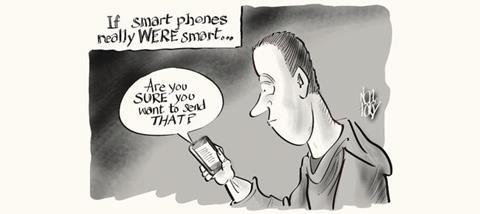
Writing in The Independent, she lamented that ‘If Jesus had been tortured and crucified today, photos would be online within seconds, along with jokes and “funny” videos. Social media enables us to fight social injustice and shine a light on acts of terror, but it has also turned us into yobs – people who rarely think of the consequences before pressing the send button’.
Her comment came after she had crossed verbal swords on BBC’s Question Time. Ms Street-Porter quickly came under smart phone fire, receiving a volley of hundreds of abusive texts, insulting her looks, tagging her as stupid, and suggesting that she deserved to die from cancer. She went on to ask a pertinent question: ‘Modern technology has turned us into a shouty society. Are we losing our ability to politely disagree?’
She’s right. When dialogue is replaced by diatribe, we all lose. Truth is not found when opponents just parry with sound bites. We must journey in rugged but respectful debate if we are to arrive at enlightened conclusions.
This virus of word-pummelling is not just infecting our wider culture, but is contaminating the Church too. During the election, there were some Christians who traded rude, derisory comments on Facebook, perhaps thinking that we can suspend our commitment to measured speech and kindness when the conversation turns political. Some Christian leaders posted statements that were loaded with generalities and simplistic solutions, implying that anyone who didn’t share their political viewpoint was idiotic, selfish, fascist/communist, or was simply just out of step with God. Obviously some policies don’t reflect what God wants, but kingdom justice doesn’t come when there’s more heat than light.
A few days after the election, the Archbishop of Canterbury, Justin Welby, gave a speech that included a sad confession, admitting that some of the worst hate mail he receives comes from Christians.
The phenomena of ranting believers is not new in the US. Politicians on Capitol Hill have long remarked that evangelical Christians are among the rudest of their constituents, USING CAPITAL LETTERS AND EXCLAMATION MARKS without restraint (!!!!!!!!!), and threatening the fires of hell if their political representative doesn’t vote as they demand. Genuine passion can have an unfortunate side effect – we shout. But concerns expressed at high volume or with a harsh tone don’t only wound those on the receiving end, but lose their credibility. It’s difficult for a politician to believe that constituents are authentically loving and caring if they act like blustering bigots, hollering insults.
And you don’t have to be a vitriolic Internet troll to become a verbal bully.
Those of us who are church leaders can adopt a troll-like posture when we demonise someone in the congregation because they bother us with awkward questions. When we tag a questioner as difficult, it’s not long before they graduate to divisive, and although we don’t actually get around to burning the witch, we can certainly shred their reputations with a few words of pious dismissal. Regrettably, I’ve done this. It’s cowardly behaviour.
At the end of his authentic and humble speech, Justin Welby offered a challenge for us all.
‘Can we model confidentiality, transparency and genuine respect for one another?’
I really hope we can.


























